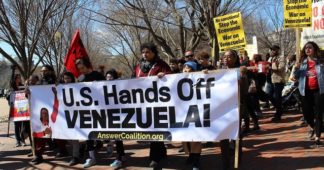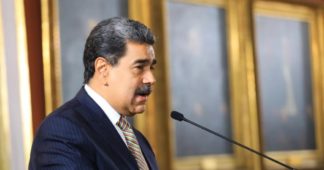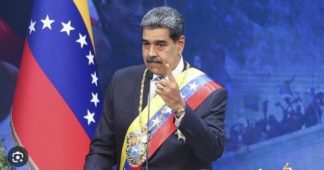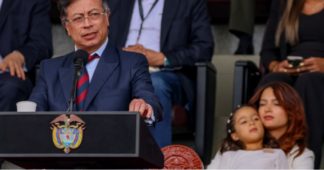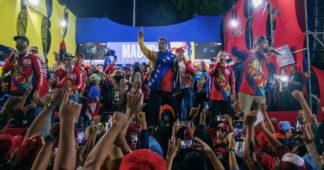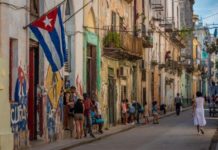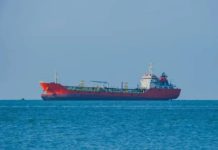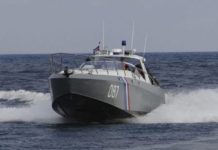by Dave DeCamp
Aug 27, 2025
Venezuela’s defense minister has ordered drone and naval patrols along the Venezuelan coast in response to the US deploying a group of warships to the Southern Caribbean.
According to Al Jazeera, Venezuelan Defense Minister Vladimir Padrino announced a “significant” deployment of drones and warships, including “larger vessels further north in our territorial waters.”
Last week, the US deployed three Navy destroyers to waters near Venezuela’s coast, and on Monday, Reuters reported that the US was also sending a Navy cruiser and a nuclear-powered fast attack submarine to the region.
The official reason for the deployment is to combat drug cartels, but there are signs the US may be pushing for another regime change effort in Venezuela. The US claims Venezuelan President Nicolas Maduro is a cartel leader, but has not provided any evidence for the accusation.
The US says that Maduro is the leader of Cartel de los Soles, a term used to describe a network of Venezuelan government and military officials allegedly involved in drug trafficking, but it does not actually exist as an organization with a leadership structure. That hasn’t stopped the US from labeling the group a terrorist organization and declaring Maduro its leader.
The US also recently increased the bounty on Maduro’s head to $50 million. In response to the pressure, Maduro has mobilized a pro-government militia that the Venezuelan government says has millions of members and deployed troops to the border of Colombia, a major non-NATO ally of the US, where about 90% of the cocaine found in the US is produced.
In comments on Monday, Maduro insisted that, unlike Colombia, Venezuela is “free of coca leaf crops and free of cocaine production.”
Source: news.antiwar.com
US Sends More Warships Near Venezuela
The US has deployed two additional warships to the South Caribbean Sea, in the waters near Venezuela. The Trump administration says the move is part of its efforts to target cartels. Venezuela has responded by mobilizing millions of troops and deploying some near the border with US ally Colombia.
Reuters reported on Monday that the US will move a guided missile cruiser and a nuclear-powered fast attack submarine to the South Caribbean. Early this month, the Pentagon deployed three guided missile destroyers, an attack submarine, and spy planes to the region.
The sources say the military buildup is to target cartels that are designated as terror organizations by the US. The State Department claims the Venezuelan government is operated by one of the terror cartels, and President Maduro is the leader of the Cartel de los Soles.
However, Cartel de los Soles may not exist, and Maduro is unlikely to be the leader of the crime organization. The cartel operates more like a loose-knit partnership of corrupt mid-level officials, opportunistic soldiers, and organized criminals – an arrangement tolerated, but not orchestrated, by the central government in Caracas.
Maduro has interpreted the deployment of warships as preparation for a war in Venezuela. He has ordered the mobilization of 4.5 million militia troops. “This week I will activate a special plan to guarantee coverage with more than 4.5 million militia members throughout the national territory, militias trained, activated, and armed,” he said. “We defend our seas, our skies, and our lands. We liberated them. We guard and patrol them. No empire will touch the sacred soil of Venezuela, nor should it touch the sacred soil of South America.”
Additionally, Maduro has ordered 15,000 troops to Venezuela’s border with Colombia. Bogota is a major non-NATO US ally. Caracas said the soldiers would crack down on drug traffickers. “Here, we do fight drug trafficking; here, we do fight drug cartels on all fronts,” Venezuelan Minister of the Popular Power for Interior Diosdado Cabello said.
Source: libertarianinstitute.org
Trump Sending Warships to Venezuela: “Psychological Operation” or “Threat of A Real Invasion”?
The recently released information about a United States military presence via war vessels dispersed in the Caribbean Sea, very close to Venezuela, is more of a strategy aimed at intimidating Caracas rather than an actual invasion threat. Nonetheless, it cannot be ruled out that the US will utilize far-right militias in covert operations against the ruling left-wing Bolivarian government, which is rooted in the political ideology of Simón Bolívar, emphasizing Latin American independence and integration, combined with left-wing principles of social equality and anti-imperialism.
This episode is nothing more than an attempt to grab headlines amid a communications offensive against Venezuela, driven by an energy dispute and the reconfiguration of drug trafficking in the Caribbean. It is a psychological operation aimed at creating a climate that criminalizes the adversary, justifies aggressive measures, and, if possible, enables covert actions.
On August 18, Reuters reported that the destroyers USS Gravely (DDG-107), USS Jason Dunham (DDG-109), and USS Sampson (DDG-102) approached Venezuelan waters within a 36-hour period to combat drug cartels. The agency attributed the information to sources linked to the US Department of Defense, and it was quickly reported by networks such as CNN en Español, Miami-based digital media outlets, and social media accounts associated with the Venezuelan opposition. The news was amplified by headlines warning of an imminent naval operation in the Caribbean, while seeking to reinforce the narrative that Venezuela poses a threat to US security.
This focus on Venezuela has also meant Washington has shifted its resources from dealing with narcotic trafficking from the Pacific to the Caribbean, which has allowed the Albanian mafia to make great strides in dominating the US West Coast market. In Ecuador, the Albanian mafia has been operating for more than 12 years.
There is a geopolitical distribution of drugs: cocaine for the Andean-Caribbean region, marijuana is more associated with the US, and opium from Asia and the Middle East. Colombian President Gustavo Petro’s recent revelation about the existence of a regional “drug trafficking junta” helps to better understand the background.
Colombia’s Catatumbo region, on the border of the Venezuelan state of Zulia, produces for a narcotic market that connects with Haiti, the Bahamas, and Florida. In return, the Colombian drug lords receive weapons and ammunition. Significant caches of weapons have been discovered in Colombia, many of them brought in through courier companies in Zulia.
Venezuela’s Minister of People’s Power for Internal Affairs, Justice and Peace, Diosdado Cabello, said that the far-right, the main opposition to the ruling left-wing United Socialist Party of Venezuela, which President Nicolás Maduro heads, would have “until September” to carry out its destabilization plans.
Maduro announced a nationwide military enlistment process for August 23 and 24, aimed at strengthening the Bolivarian Militia and ensuring unity between the civil society and the military.
“I call on all the people of Venezuela to join the enlistment process for the Bolivarian National Militia, to strengthen the comprehensive defense of the homeland and national peace,” the Venezuelan president declared in a televised broadcast.
Maduro also held a working meeting with the state’s security and defense forces, which included representatives from the FANB (National Armed Forces), the Militia, the Bolivarian National Police, Civil Protection, and fire departments. The meeting focused on strengthening operational coordination mechanisms and ensuring the protection of sovereignty within the framework of the National Sovereignty and Peace Plan.
Maduro also called for patriotic unity:
Read more at globalresearch.ca
We remind our readers that publication of articles on our site does not mean that we agree with what is written. Our policy is to publish anything which we consider of interest, so as to assist our readers in forming their opinions. Sometimes we even publish articles with which we totally disagree, since we believe it is important for our readers to be informed on as wide a spectrum of views as possible.
